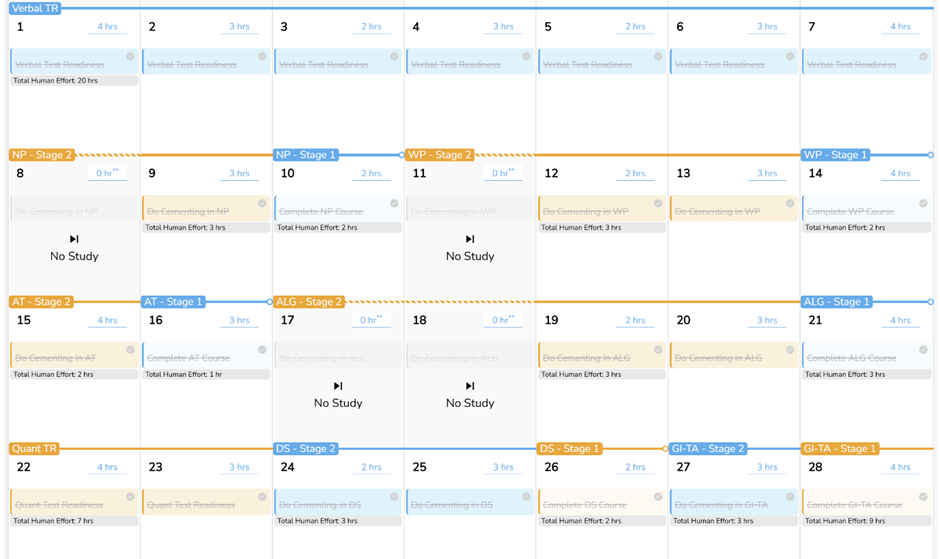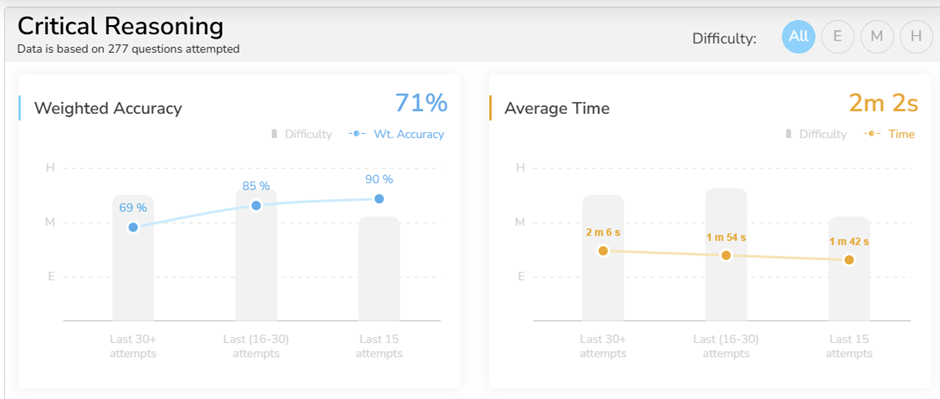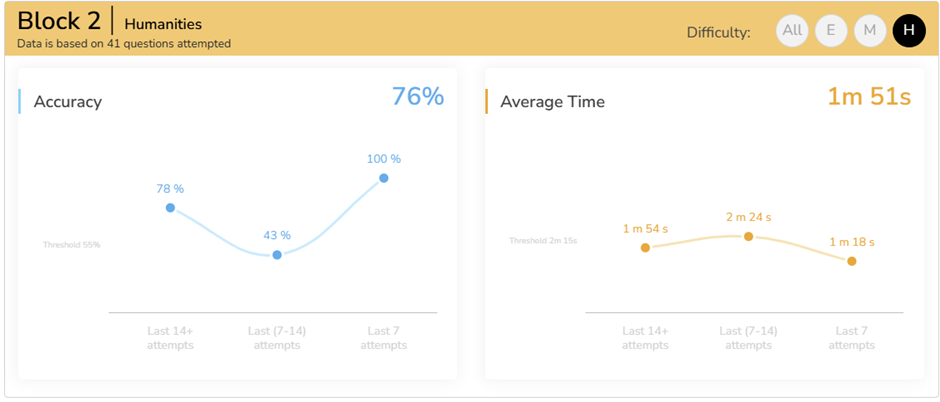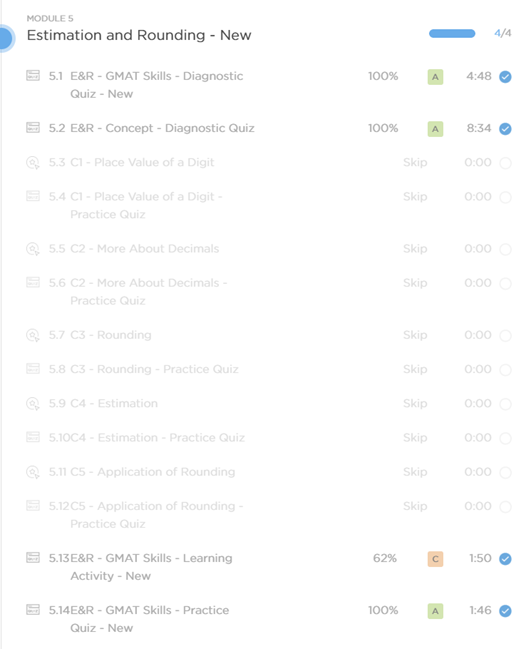Events & Promotions
|
|

GMAT Club Daily Prep
Thank you for using the timer - this advanced tool can estimate your performance and suggest more practice questions. We have subscribed you to Daily Prep Questions via email.
Customized
for You
Track
Your Progress
Practice
Pays
Not interested in getting valuable practice questions and articles delivered to your email? No problem, unsubscribe here.
- Nov 19
12:30 PM EST
-01:30 PM EST
Learn how Keshav, a Chartered Accountant, scored an impressive 705 on GMAT in just 30 days with GMATWhiz's expert guidance. In this video, he shares preparation tips and strategies that worked for him, including the mock, time management, and more - Nov 18
11:00 AM PST
-12:00 PM PST
Join us in a live GMAT practice session and solve 30 challenging GMAT questions with other test takers in timed conditions, covering GMAT Quant, Data Sufficiency, Data Insights, Reading Comprehension, and Critical Reasoning questions. - Nov 20
01:30 PM EST
-02:30 PM IST
Learn how Kamakshi achieved a GMAT 675 with an impressive 96th %ile in Data Insights. Discover the unique methods and exam strategies that helped her excel in DI along with other sections for a balanced and high score. - Nov 22
11:00 AM IST
-01:00 PM IST
Do RC/MSR passages scare you? e-GMAT is conducting a masterclass to help you learn – Learn effective reading strategies Tackle difficult RC & MSR with confidence Excel in timed test environment - Nov 23
11:00 AM IST
-01:00 PM IST
Attend this free GMAT Algebra Webinar and learn how to master the most challenging Inequalities and Absolute Value problems with ease. - Nov 24
07:00 PM PST
-08:00 PM PST
Full-length FE mock with insightful analytics, weakness diagnosis, and video explanations! - Nov 25
10:00 AM EST
-11:00 AM EST
Prefer video-based learning? The Target Test Prep OnDemand course is a one-of-a-kind video masterclass featuring 400 hours of lecture-style teaching by Scott Woodbury-Stewart, founder of Target Test Prep and one of the most accomplished GMAT instructors.
Kudos
Bookmarks
Hey everyone! I'm Shrutav, an IIT Madras graduate working in the tech industry for about a year and a half now. I recently took the GMAT and was fortunate enough to score a perfect 805 on my latest attempt. I'm still in disbelief about it, to be honest. When I saw the score pop up on the screen, I had to look at it a couple of times to make sure I wasn't seeing things!
My path wasn't straightforward. Starting in December, my biggest challenge was simply establishing a study routine after being away from academics.
I never imagined I'd achieve a perfect score. In fact, my first attempt resulted in a 695—respectable, but I knew I could do better. With just 20-25 days of strategic adjustments between attempts, I achieved the perfect 805.
Let me walk you through my journey and hopefully provide some insights that might help you on your own GMAT adventure.
My Initial Challenges and how having a study plan helped:
As a working professional, my main hurdle wasn't content but finding the discipline to study consistently after long workdays. The e-GMAT personalized study plan was crucial—it mapped everything from day one to test day and highlighted my weak areas to maximize efficiency. he plan mapped everything out from day one until my test date, giving me clarity on how much time I needed to dedicate daily and weekly.

This made the whole process feel more manageable.
I followed a routine of 1-2 focused hours daily, treating the plan as non-negotiable. Instead of counting questions solved, I measured progress through analytics that identified specific mistake patterns. This data-driven approach helped me make targeted improvements despite my busy schedule.
V90:
When I started my verbal preparation, the main challenge was understanding what the questions were actually asking. Despite having a decent starting level, I found Critical Reasoning particularly tricky because the answer choices seemed so similar.
The game-changer for me was learning the concept of pre-thinking in CR. Initially, I'd just read the argument and jump straight to the answer choices, which often led to confusion. e-GMAT introduced this crucial middle step - after reading the argument but before looking at options, I'd take time to understand why each word and sentence was included and form my own conclusions. Once I had these conclusions in mind, eliminating wrong answers became much easier.
With consistent practice, this pre-thinking process became second nature. My confidence grew tremendously, and I could approach even the toughest CR questions knowing I had a systematic way to crack them. My accuracy improved to nearly 100% and my time came down to less than 2 min:

Reading Comprehension presented a different challenge. During my first GMAT attempt, I received three humanities and historical passages - exactly my weak spot! This experience forced me to take reading strategies seriously. I learned to approach each paragraph methodically, considering why it was included and how it connected to the main idea.
Following this structured approach for each passage and practicing consistently helped me handle even complex history-based passages with confidence. By the time I took my second attempt, I felt ready for any type of RC passage the GMAT could throw at me. My accuracy for the humanities had reached 100%:

The combination of pre-thinking for CR and systematic reading strategies for RC transformed my verbal performance. From being unsure about answer choices, I developed the confidence to tackle any verbal question methodically. This strong verbal foundation also helped me later with the verbal aspects of Data Insights questions.
Q90:
With my engineering background, I started with a solid foundation in Quant (around Q85-86), but there was still room for improvement. Unlike Verbal where I needed to learn new approaches, my Quant journey was about refining my existing skills and fixing specific weaknesses.
e-GMAT's data-driven approach was instrumental in identifying exactly where I needed to focus. Through the cementing quizzes, I discovered that my weaknesses weren't necessarily conceptual gaps but rather process flaws. I was making careless mistakes – solving a problem correctly but marking the wrong answer because I hadn't carefully read what the question was asking.
The PACE engine was a game-changer for me. It gave me diagnostic quizzes to pinpoint my weak areas and then created a customized learning path that saved me over 40 hours of study time. For stronger areas like Estimation and Rounding, it recommended skipping most content and jumping straight to GMAT-specific applications:

This targeted approach meant I didn't waste time reviewing concepts I already knew well.
My number properties accuracy improved to 100% with focused practice, and more importantly, my solving time decreased to around 1:30 minutes per question. This efficiency was crucial since it gave me buffer time for more challenging questions on test day.
The most significant improvement in my Quant preparation came from learning to read questions more carefully. As my mentor Rashmi, pointed out, it wasn't about learning new math concepts, but about understanding exactly what each question was asking. This attention to detail, combined with the process skills I developed through consistent practice, helped me achieve a perfect Q90 on my second attempt.
DI90:
Data Insights initially seemed straightforward – with only 20 questions, I naively thought time management wouldn't be an issue. I was wrong. This section actually presented my biggest time management challenge.
The main culprit was Multi-Source Reasoning (MSR) questions. Each MSR set would take me about 4 minutes just to read through all the tabs, before even attempting the 2-3 questions that followed. I quickly realized I needed a strategic approach.
What really helped was e-GMAT's comprehensive DI course.
The variety of DI questions in the practice materials was crucial. On the actual exam, I encountered graph types completely different from what I had seen in my first attempt, but because of the diverse practice, I felt prepared for anything.
My strategy evolved to leverage my strengths. Data Sufficiency was a strong point, so I aimed to solve these questions in about 1.5 minutes each, banking time for the more complex MSRs. I learned to identify my weak points (like MSRs) and make deliberate decisions about question management – sometimes choosing to skip a question initially and return to it after completing easier ones.
The "owning the dataset" approach taught in the course was invaluable for MSRs. Instead of diving into questions immediately, I'd take time upfront to understand all the data thoroughly. This initial investment paid off as I could answer the subsequent questions more efficiently.
By test day, I had turned what was once my most challenging section into another perfect score. This transformation came not from solving countless questions randomly, but from strategic practice with high-quality materials that mimicked the actual GMAT experience.
My First GMAT Attempt: 695
After months of preparation, I took my first GMAT and scored a 695. While it isa great score, I knew I hadn't performed to my full potential. Looking at my sectional breakdown, I could see where things had gone wrong.
In Verbal, I encountered three history-based RC passages – precisely my weakness at that time. Since I hadn't fully committed to the reading strategies I'd learned, these passages threw me off balance. I ended up spending too much time trying to comprehend them, which affected my pacing for the rest of the section. I even ran out of time before completing all questions.
The Data Insights section presented another challenge. I faced two complex MSR questions and spent far too long on them, forcing me to guess on the final 3-4 questions. My time management strategy clearly needed refinement.
Even in Quant, where I was strongest, I made a few careless errors by misreading what questions were asking – a recurring issue I'd identified during practice but hadn't fully resolved.
Beyond the technical aspects, I realized my mental approach wasn't optimal. I'd spent the entire day before the exam cramming, reviewing my error logs, and going through notes. By test day, I was mentally exhausted before even beginning the exam. The pressure I put on myself created anxiety that affected my performance.
Walking out with a 695, I experienced mixed emotions – pride at achieving a solid score, but also the certainty that I could do better. After discussing with Rashmi, we agreed that with some targeted adjustments and the right mindset, a second attempt could yield significantly better results.
What did I do between my 2 attempts:
The 20-25 days between my two attempts were not about learning new content or solving hundreds of additional questions. Instead, I focused on refining my approach and developing the right mindset. The strategy was to be in a steady state of solving questions and attempting 3-4 mocks, to keep up the momentum.
My LMP mentor Rashmi helped analyze my performance and develop targeted strategies for each section, including contingency plans for challenging scenarios.
The mental aspect made the biggest difference. Instead of cramming before my second attempt, I prioritized rest—taking a nap and chatting with family about non-GMAT topics. This mental freshness allowed me to approach the test with confidence and clarity.
During the exam, if something threw me off, I had predetermined strategies: pause briefly, refocus, and tackle the question methodically. This mental resilience proved as important as content knowledge.
The Mental Game: Achieving 805
On my second attempt, I approached the test with a completely different mindset. The biggest difference was being mentally fresh.
During the test, I maintained confidence with predetermined strategies: if something threw me off, I'd briefly pause, refocus, and tackle the question methodically. This mental resilience was as crucial as content knowledge.
When I saw "805" appear on screen, I couldn't believe it. I had to look multiple times to make sure it was real. This experience taught me that GMAT success isn't just about knowledge but performance under pressure. The difference between 695 and 805 wasn't additional studying but creating the right conditions to perform at my best.
Support Systems That Made the Difference
Looking back at my journey, several key support systems were instrumental in achieving this rare perfect score. These resources didn't just provide content but transformed my approach to GMAT preparation.
The Last Mile Push program from e-GMAT proved invaluable. Having a mentor who had guided many students through this process made a significant difference. While I could take mocks and sectional tests on my own, having expert guidance to analyze those results and create strategic plans forward elevated my preparation. My mentor Rashmi, helped me see patterns I might have missed and provided the accountability and structure needed to make continuous progress.
The data-driven approach to preparation was another game-changer. e-GMAT's analytics platform simplified the process of identifying mistake patterns and improving systematically. Instead of spending hours trying to figure out what went wrong, the platform did that analysis for me, allowing me to focus on actually fixing those issues. This shift from blindly solving questions to strategic, targeted improvement made my study time far more efficient.
I also found tremendous value in the sectional mocks. These allowed me to maintain peak performance in sections I'd already completed while working on others. After finishing Verbal and moving to Quant, I could still take Verbal sectional tests to ensure my skills remained sharp. This maintained the momentum throughout my preparation.
Throughout my journey, I learned that quality trumps quantity. Rather than solving thousands of questions, I focused on getting the most out of each practice session through detailed analysis and reflection. This approach, guided by data and expert mentorship, allowed me to progress efficiently despite my busy work schedule.
Looking back at my journey to a perfect 805, focusing on quality over quantity was crucial. Mastering fundamental techniques like pre-thinking in CR and careful reading in Quant made more difference than endless practice questions.
Mental preparation was equally important. Being well-rested and calm on test day significantly impacted my performance - I recommend avoiding study the day before the exam.
The GMAT tests performance under pressure as much as knowledge. By focusing on consistent improvement rather than a specific target score, I was able to achieve results beyond my expectations.

GMAT-Club-Forum-mo8y5exw.png [ 127.79 KiB | Viewed 5771 times ]

GMAT-Club-Forum-4euiu25p.png [ 56.38 KiB | Viewed 5642 times ]

GMAT-Club-Forum-spkfjk48.png [ 50.85 KiB | Viewed 5496 times ]

GMAT-Club-Forum-rom2sdfs.png [ 53.93 KiB | Viewed 5428 times ]
My path wasn't straightforward. Starting in December, my biggest challenge was simply establishing a study routine after being away from academics.
I never imagined I'd achieve a perfect score. In fact, my first attempt resulted in a 695—respectable, but I knew I could do better. With just 20-25 days of strategic adjustments between attempts, I achieved the perfect 805.
Let me walk you through my journey and hopefully provide some insights that might help you on your own GMAT adventure.
My Initial Challenges and how having a study plan helped:
As a working professional, my main hurdle wasn't content but finding the discipline to study consistently after long workdays. The e-GMAT personalized study plan was crucial—it mapped everything from day one to test day and highlighted my weak areas to maximize efficiency. he plan mapped everything out from day one until my test date, giving me clarity on how much time I needed to dedicate daily and weekly.
This made the whole process feel more manageable.
I followed a routine of 1-2 focused hours daily, treating the plan as non-negotiable. Instead of counting questions solved, I measured progress through analytics that identified specific mistake patterns. This data-driven approach helped me make targeted improvements despite my busy schedule.
V90:
When I started my verbal preparation, the main challenge was understanding what the questions were actually asking. Despite having a decent starting level, I found Critical Reasoning particularly tricky because the answer choices seemed so similar.
The game-changer for me was learning the concept of pre-thinking in CR. Initially, I'd just read the argument and jump straight to the answer choices, which often led to confusion. e-GMAT introduced this crucial middle step - after reading the argument but before looking at options, I'd take time to understand why each word and sentence was included and form my own conclusions. Once I had these conclusions in mind, eliminating wrong answers became much easier.
With consistent practice, this pre-thinking process became second nature. My confidence grew tremendously, and I could approach even the toughest CR questions knowing I had a systematic way to crack them. My accuracy improved to nearly 100% and my time came down to less than 2 min:
Reading Comprehension presented a different challenge. During my first GMAT attempt, I received three humanities and historical passages - exactly my weak spot! This experience forced me to take reading strategies seriously. I learned to approach each paragraph methodically, considering why it was included and how it connected to the main idea.
Following this structured approach for each passage and practicing consistently helped me handle even complex history-based passages with confidence. By the time I took my second attempt, I felt ready for any type of RC passage the GMAT could throw at me. My accuracy for the humanities had reached 100%:
The combination of pre-thinking for CR and systematic reading strategies for RC transformed my verbal performance. From being unsure about answer choices, I developed the confidence to tackle any verbal question methodically. This strong verbal foundation also helped me later with the verbal aspects of Data Insights questions.
Q90:
With my engineering background, I started with a solid foundation in Quant (around Q85-86), but there was still room for improvement. Unlike Verbal where I needed to learn new approaches, my Quant journey was about refining my existing skills and fixing specific weaknesses.
e-GMAT's data-driven approach was instrumental in identifying exactly where I needed to focus. Through the cementing quizzes, I discovered that my weaknesses weren't necessarily conceptual gaps but rather process flaws. I was making careless mistakes – solving a problem correctly but marking the wrong answer because I hadn't carefully read what the question was asking.
The PACE engine was a game-changer for me. It gave me diagnostic quizzes to pinpoint my weak areas and then created a customized learning path that saved me over 40 hours of study time. For stronger areas like Estimation and Rounding, it recommended skipping most content and jumping straight to GMAT-specific applications:
This targeted approach meant I didn't waste time reviewing concepts I already knew well.
My number properties accuracy improved to 100% with focused practice, and more importantly, my solving time decreased to around 1:30 minutes per question. This efficiency was crucial since it gave me buffer time for more challenging questions on test day.
The most significant improvement in my Quant preparation came from learning to read questions more carefully. As my mentor Rashmi, pointed out, it wasn't about learning new math concepts, but about understanding exactly what each question was asking. This attention to detail, combined with the process skills I developed through consistent practice, helped me achieve a perfect Q90 on my second attempt.
DI90:
Data Insights initially seemed straightforward – with only 20 questions, I naively thought time management wouldn't be an issue. I was wrong. This section actually presented my biggest time management challenge.
The main culprit was Multi-Source Reasoning (MSR) questions. Each MSR set would take me about 4 minutes just to read through all the tabs, before even attempting the 2-3 questions that followed. I quickly realized I needed a strategic approach.
What really helped was e-GMAT's comprehensive DI course.
The variety of DI questions in the practice materials was crucial. On the actual exam, I encountered graph types completely different from what I had seen in my first attempt, but because of the diverse practice, I felt prepared for anything.
My strategy evolved to leverage my strengths. Data Sufficiency was a strong point, so I aimed to solve these questions in about 1.5 minutes each, banking time for the more complex MSRs. I learned to identify my weak points (like MSRs) and make deliberate decisions about question management – sometimes choosing to skip a question initially and return to it after completing easier ones.
The "owning the dataset" approach taught in the course was invaluable for MSRs. Instead of diving into questions immediately, I'd take time upfront to understand all the data thoroughly. This initial investment paid off as I could answer the subsequent questions more efficiently.
By test day, I had turned what was once my most challenging section into another perfect score. This transformation came not from solving countless questions randomly, but from strategic practice with high-quality materials that mimicked the actual GMAT experience.
My First GMAT Attempt: 695
After months of preparation, I took my first GMAT and scored a 695. While it isa great score, I knew I hadn't performed to my full potential. Looking at my sectional breakdown, I could see where things had gone wrong.
In Verbal, I encountered three history-based RC passages – precisely my weakness at that time. Since I hadn't fully committed to the reading strategies I'd learned, these passages threw me off balance. I ended up spending too much time trying to comprehend them, which affected my pacing for the rest of the section. I even ran out of time before completing all questions.
The Data Insights section presented another challenge. I faced two complex MSR questions and spent far too long on them, forcing me to guess on the final 3-4 questions. My time management strategy clearly needed refinement.
Even in Quant, where I was strongest, I made a few careless errors by misreading what questions were asking – a recurring issue I'd identified during practice but hadn't fully resolved.
Beyond the technical aspects, I realized my mental approach wasn't optimal. I'd spent the entire day before the exam cramming, reviewing my error logs, and going through notes. By test day, I was mentally exhausted before even beginning the exam. The pressure I put on myself created anxiety that affected my performance.
Walking out with a 695, I experienced mixed emotions – pride at achieving a solid score, but also the certainty that I could do better. After discussing with Rashmi, we agreed that with some targeted adjustments and the right mindset, a second attempt could yield significantly better results.
What did I do between my 2 attempts:
The 20-25 days between my two attempts were not about learning new content or solving hundreds of additional questions. Instead, I focused on refining my approach and developing the right mindset. The strategy was to be in a steady state of solving questions and attempting 3-4 mocks, to keep up the momentum.
My LMP mentor Rashmi helped analyze my performance and develop targeted strategies for each section, including contingency plans for challenging scenarios.
The mental aspect made the biggest difference. Instead of cramming before my second attempt, I prioritized rest—taking a nap and chatting with family about non-GMAT topics. This mental freshness allowed me to approach the test with confidence and clarity.
During the exam, if something threw me off, I had predetermined strategies: pause briefly, refocus, and tackle the question methodically. This mental resilience proved as important as content knowledge.
The Mental Game: Achieving 805
On my second attempt, I approached the test with a completely different mindset. The biggest difference was being mentally fresh.
During the test, I maintained confidence with predetermined strategies: if something threw me off, I'd briefly pause, refocus, and tackle the question methodically. This mental resilience was as crucial as content knowledge.
When I saw "805" appear on screen, I couldn't believe it. I had to look multiple times to make sure it was real. This experience taught me that GMAT success isn't just about knowledge but performance under pressure. The difference between 695 and 805 wasn't additional studying but creating the right conditions to perform at my best.
Support Systems That Made the Difference
Looking back at my journey, several key support systems were instrumental in achieving this rare perfect score. These resources didn't just provide content but transformed my approach to GMAT preparation.
The Last Mile Push program from e-GMAT proved invaluable. Having a mentor who had guided many students through this process made a significant difference. While I could take mocks and sectional tests on my own, having expert guidance to analyze those results and create strategic plans forward elevated my preparation. My mentor Rashmi, helped me see patterns I might have missed and provided the accountability and structure needed to make continuous progress.
The data-driven approach to preparation was another game-changer. e-GMAT's analytics platform simplified the process of identifying mistake patterns and improving systematically. Instead of spending hours trying to figure out what went wrong, the platform did that analysis for me, allowing me to focus on actually fixing those issues. This shift from blindly solving questions to strategic, targeted improvement made my study time far more efficient.
I also found tremendous value in the sectional mocks. These allowed me to maintain peak performance in sections I'd already completed while working on others. After finishing Verbal and moving to Quant, I could still take Verbal sectional tests to ensure my skills remained sharp. This maintained the momentum throughout my preparation.
Throughout my journey, I learned that quality trumps quantity. Rather than solving thousands of questions, I focused on getting the most out of each practice session through detailed analysis and reflection. This approach, guided by data and expert mentorship, allowed me to progress efficiently despite my busy work schedule.
Looking back at my journey to a perfect 805, focusing on quality over quantity was crucial. Mastering fundamental techniques like pre-thinking in CR and careful reading in Quant made more difference than endless practice questions.
Mental preparation was equally important. Being well-rested and calm on test day significantly impacted my performance - I recommend avoiding study the day before the exam.
The GMAT tests performance under pressure as much as knowledge. By focusing on consistent improvement rather than a specific target score, I was able to achieve results beyond my expectations.
Attachment:
GMAT-Club-Forum-mo8y5exw.png [ 127.79 KiB | Viewed 5771 times ]
Attachment:
GMAT-Club-Forum-4euiu25p.png [ 56.38 KiB | Viewed 5642 times ]
Attachment:
GMAT-Club-Forum-spkfjk48.png [ 50.85 KiB | Viewed 5496 times ]
Attachment:
GMAT-Club-Forum-rom2sdfs.png [ 53.93 KiB | Viewed 5428 times ]
Kudos
Bookmarks
Amazing improvement 

Thank you for verifying your score!
Thank you for verifying your score!
Kudos
Bookmarks
Phenomenal score, Shrutav
Wondering why such an insightful and detailed post has remained undiscovered 3 days after being posted.
Looking forward to reading some amazing b-school conversion stories soon.
Wondering why such an insightful and detailed post has remained undiscovered 3 days after being posted.
Looking forward to reading some amazing b-school conversion stories soon.






















